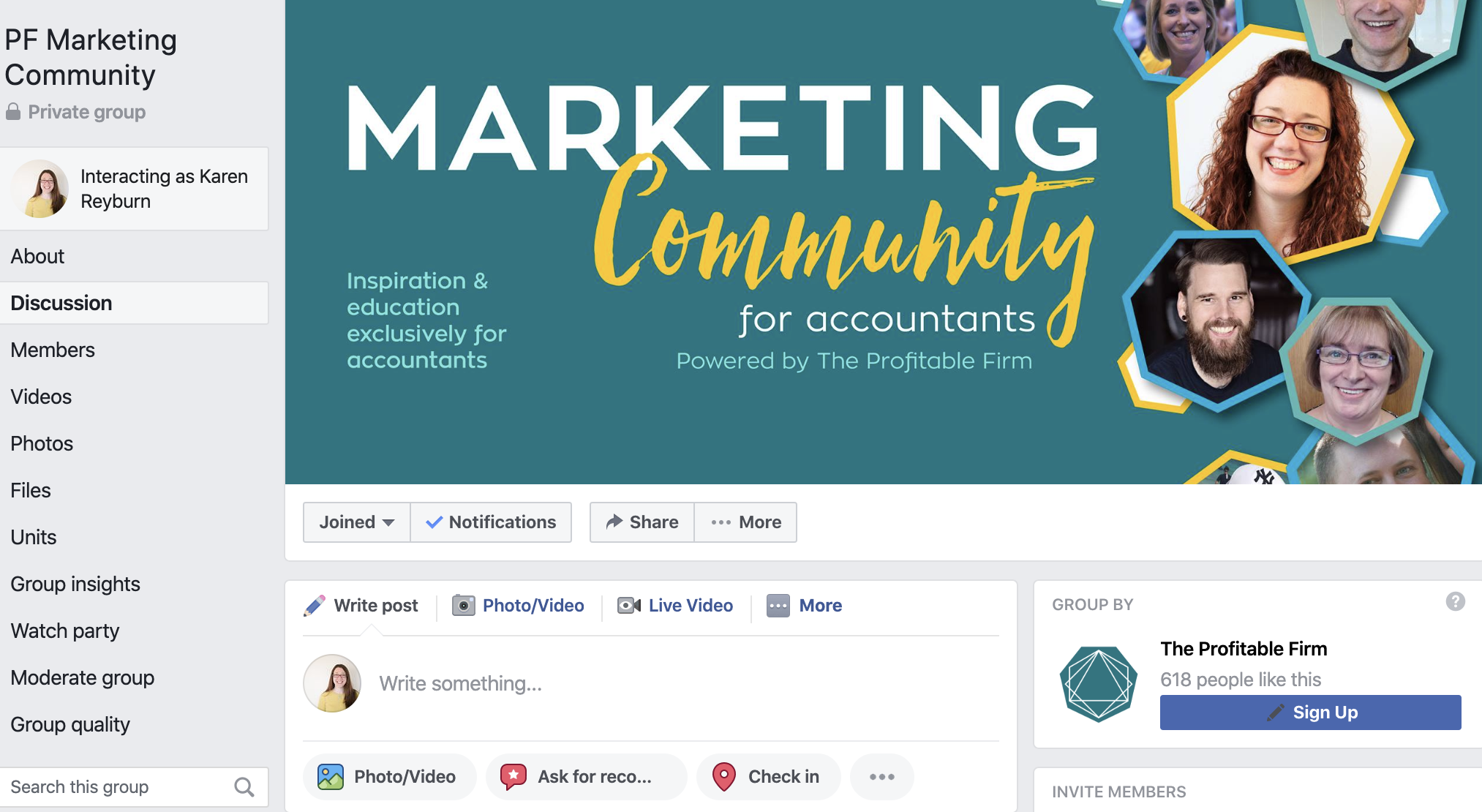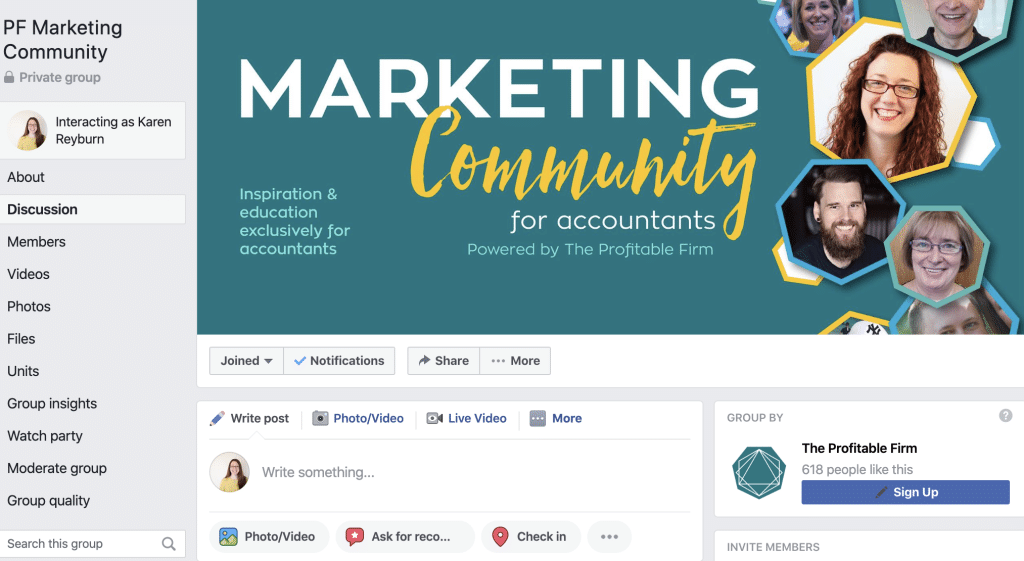
Question today: “Decided this morning I’m going to setup a Facebook group for my clients, the other advisers that work with my clients (IFA’s, Lawyers, Lenders etc) so that everyone can chat/share and generally get through this shit together. You guys got any guides on setting up a private FB group?”
You’re starting to realise how much your clients need help – urgent help, practical help. And you’re doing everything you can to help them one on one, or direct them to the person or company who can help them – but what if they could help each other, too?
A few of our accountants have already started setting up Facebook groups (or Slack communities) for their clients for this purpose, and want a little direction. Here you go.
- Just set it up. Just start. If you’re learning anything from these crazy times it’s that we do not have time to mess about with getting things perfect. I’ve seen accountants recording video, editing video, setting up YouTube accounts, running live webinars – doing all those things you held off doing because of fear, or confusion, or no time. Now we’re all full of fear and confusion together, and everyone has a little extra time, so let’s do this. The same applies to setting up a Facebook group (or whatever platform you choose to use). In my opinion Facebook is the simplest, easiest one because almost everyone in the world has a Facebook account, and Facebook seems to be best for groups. I’ve joined a few in LinkedIn but the community feel isn’t the same, and my only other preference is Slack. It can be a little harder to get people using slack (most people are already familiar with Facebook), but we use it for PF clients (private channels for client-only conversations in relation to their own marketing, or public channels for all our clients). It works really well.
- Engagement and conversation is the key: Normally I’d say it will take a little while for people to begin posting, but I think in these times they’ll be posting a lot. Don’t be the only one posting: gather some conversation starters around you and direct clients to ask questions in the Facebook group as opposed to via email. Encourage others to reply by tagging them in the appropriate post – ie “Andy you had something similar – what system did you use?”, that sort of thing.
- Set rules first: You can list these in your group so it’s visible and people have to accept them when they join. Keep the rules simple, clear, and specific. You can say things like “Be kind, be positive, no selling or discount offers” – and you can also say “This industry only” or “If we find out you’re selling to people privately we’ll chuck you out with no warning”. It’s your group. You call the rules.
- Make it approval-only: If this is a group for clients, your priority is to make it a safe space. Decide if you want to allow other advisors or companies or people who aren’t connected with your business. In terms of the specific question we were asked, about inviting in other advisors such as IFAs, lenders etc… we suggest thinking ahead to how you want this group to be. It’s really hard for even the best advisors not to be salesy. If it’s a clients-only group, a safe space where they can ask anything and say anything and share fears and concerns without being sold to, it’s your responsibility to keep it that way. You can always direct them to someone as needed, or invite in an advisor to answer a specific question (but giving them very clear guidelines that this is for giving information only and not selling, and if you find out they’re selling or gathering emails or whatever else, you’ll chuck them out without warning). I’ve seen this go wrong in too many other groups. Most of you would have advisors who are awesome and kind and helpful, I’m sure – but be careful. And kick out anyone you don’t like, don’t want, or who doesn’t play by the rules.
- Direct people there when they ask questions: When a client asks a question you know others have asked, you can answer their question quickly by email or text or wherever they asked it, but then say “hey could you ask this in the Facebook group too so we can start a conversation on it?” You’ll notice at the end of this post we encourage you to come to the PF Marketing Community facebook group and share anything you like. It’s for accountants only, and we will turf out anyone who is too self promotional or tries to sell. There are only a few people in there who actually sell to accountants, and we’ve let them in because they’re friends, they’re trusted, and they honour the rules.
- Build it with the future in mind: Remember what you want this group to look like when it’s all over, when we’ve passed this urgent time and moved into our new normal. Build it and shape it the way you’ll want it to run in calmer days. Think about the rules, the people, the sharing, the victories. Involve your team. Write content and share it. Record video. Use it for announcements.
- Give it a meaningful name, but don’t be too clever: We don’t have time to faff about with super clever titles: just call it what it is. We called ours the PF Marketing Community, because it’s all about community, it’s owned by PF, and it’s for accountants who want to do marketing well. We could have also said Marketing group for accountants, but we wanted it to be something people can belong to (not generic). Think like a podcast title. Camilla and I joined a course called “The Podcast Academy” (also a simple name) and when we were discussing podcast names, the leader (Colin Gray) said “Make it boring, and it will be useful” and “They don’t care that you’re Nikki from Pink Giraffe, they just want to consume content about what they care about.” He used the example of the film title “Snakes on a plane” – 100% of people will know what that film is about even if they haven’t seen it. I remember when that film first came out and I thought, what a stupid title. Then I thought well, to be fair it definitely tells you what it’s about! That’s what your facebook group needs to be.
- Share fun things too. Don’t make it too businessy. Make it real and human and cause it to be a place they enjoy. If we’re seeing anything so far in this brave new world it’s that humanity and authenticity are everything. We’ve hesitated in the past to say we’re scared, or worried, or sad, or struggling. We didn’t want people to think we weren’t being professional, or our business was in trouble. Now the entire world is a scary place, but that also makes it a safe place. We can say “I’m completely not productive today” and people will encourage us and say “me too”. We can say “I’m going to go binge watch Netflix” and people won’t judge us. (Okay a few people will, but who cares about them?) I admit I have a few people I used to follow who were all positive and motivating and LET’S DO THIS and think positive and stay strong….but now some of their posts are coming across quite judgmental, and thoughtless, and even cruel. It’s all very well to tell people not to watch netflix or eat crap food whilst stuck in the house…and that’s generally quite good advice…but it takes us a little while to settle. So, let your Facebook group be a place where people can share however they’re feeling, and get support.
- Design a cool header: You don’t have to rush to do this – I wouldn’t worry about it until you have a title and some people actually using the group. If you’re already using PF or a service like DesignPickle, you can get a header designed for your Facebook group that’s all on-brand and beautifully designed and very appealing. If you literally don’t have the funding for it right now, just message me on Instagram and I’ll sketchnote you one, no charge. Tell me what your group name is and what your brand colours are, and I’ll sketch it out and send it over. It won’t be the most perfect header ever but it will be fun for us all, and it will be real.
Continue the discussion in the PF Marketing Community Facebook group which is for accountants only. You’ll get input and cheer from the PF team and other accountants. You’re not alone!

